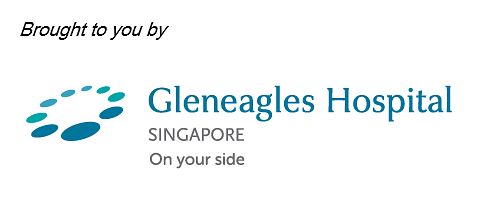BRANDED CONTENT
'Get yourself checked, no matter your age': What breast cancer survivor Jamie Yeo wants women to know
Recounting the roller-coaster of emotions she felt after finding out her lump was malignant, she now urges women to be proactive about cancer screening

After detecting her breast cancer early, Jamie Yeo now encourages women to go for regular screenings. PHOTO: JAMIE YEO
Follow topic:
During a regular breast self-examination in 2021, former radio deejay Jamie Yeo felt a lump in her breast. She didn’t think much of it but decided to arrange for a health screening just to be on the safe side.
She underwent a targeted ultrasound and biopsy. The biopsy results were inconclusive, but she decided to remove the lump. During the surgery, the doctors discovered that the lump was indeed cancerous.
“I just didn't know how to react because I had gone through all this roller-coaster of emotions. When it was confirmed, I was just shocked. But then I was very relieved because at that point it had already been taken out,” she recalls.
Watch Jamie Yeo’s cancer journey in this video:
As her cancer was detected early, her doctor recommended radiation therapy to target the affected area. She did 20 sessions and finished a course of medication to block oestrogen.
“Radiation therapy or radiotherapy can help deal with residual or potentially malignant cells which may not be detected at the time of diagnosis. It can reduce the risk of the cancer coming back to the same area where it was first found, from a lifelong risk of over 35 per cent to about 19 per cent. The risk of mortality from breast cancer also drops by 4 per cent from 25 to 21 percent,” explains Dr Yang Tuck Loong, a radiation oncologist at Gleneagles Hospital.
Two years later, Ms Yeo has become a strong advocate of early screening and testing. She is sharing her story to help protect the health and lives of other women.
“Get yourself checked. The good thing about breast cancer is you can feel for it [lumps], and catch it early. No matter how young you are, it really just takes a few minutes to self-examine and only a few hours to get professional screening,” says the mother-of-two, with children aged six and 12.
Getting appropriate care for your situation
What happens after getting a diagnosis for cancer? In Ms Yeo’s case, she recalls being “very scared”.
“One minute you’re numb, one minute you’re just so fearful you can’t even speak,” she says.
She decided to go to Gleneagles Hospital as she’d given birth to her daughter, and always felt comfortable, there.
The hospital focuses on helping its patients navigate their treatment with the aim of regaining their quality of life.
Gleneagles Hospital Singapore chief executive officer Thomas Wee says: “At Gleneagles, the patient is at the centre of all that we do. Personifying our tagline ‘On Your Side’, our multi-disciplinary team empathises with the patient, to understand his or her needs. In this way, we ensure the patient's healing journey is complete and comprehensive.”
Ms Yeo had a team of multidisciplinary healthcare professionals including a medical oncologist, surgeon, radiation oncologist and nurses to care for her and to work out a comprehensive and customised treatment roadmap from diagnosis to post-surgery recovery.

“Having cancer gave me a fresh perspective on life and I knew what really mattered in life,” says Ms Yeo.
“I can’t emphasise enough how important it is to detect cancer early.”
Why early screening for cancer matters
Breast cancer is the most common cancer among women in Singapore, and also the leading cause of cancer death among women here.
However, it is also one of the most detectable and, if detected early, it is treatable. Screening for breast cancer includes self-examination of the breast and a mammogram.
Other than breast cancer, other types of cancers can also be detected via screening.
Dr Bertha Woon, general and breast surgeon at Gleneagles Hospital, says: “Early detection of common cancers such as breast cancer, colon cancer, lung cancer – and for women, cervical cancer – can save lives. It leads to less treatment, higher chance of recovery, lower chance of recurrence, less intense treatment and less financial outlay. Screening can mean the difference between curing and symptomatic management.”
One in four people may develop cancer in their lifetime and screening is one of the most efficient ways to detect and get treatment before cancer spreads.
If breast cancer is detected and it is localised or has not spread, the five-year survival rate is 99 per cent. The survival rate is 86 per cent if the cancer has spread to the regional lymph nodes, according to the American Cancer Society.
However, Dr Woon cautions that these statistics are only rough estimates as there are many different variables to consider.
The survival rates are also different for different types of cancer, which is why early detection is still a priority.
Most common cancers among women in Singapore
- The most commonly diagnosed cancer, breast cancer will affect one in 13 women in Singapore in their lifetime.
- Screening tests: Self-examination of the breast and mammogram.
- Who should go for screening: Women aged 40 to 49 should go for yearly mammograms; once every two years for those aged 50 to 69. Dr Woon notes: “If any lumps are detected before the age of 40, it is recommended to schedule an appointment with a breast specialist.” She adds those with a family history of breast cancer should go for screening 10 years before the age of the youngest person in the family with cancer.
- The five-year survival rate of colorectal cancer among women is at 62.4 per cent, according to the Singapore Cancer Registry.
- Screening tests: Fecal occult blood test and colonoscopy.
- Who should go for screening: Individuals aged 50 and above, those with a family history of colorectal cancer, familial adenomatous polyposis and hereditary non-polyposis colorectal cancer. Dr Quah Hak Mien, colorectal and general surgeon at Gleneagles Hospital, says: “Those with a personal history of colorectal polyps, colorectal malignancy and ovarian or endometrial cancer, as well as individuals with inflammatory bowel disease, are also recommended to go for screening.”
- In Singapore, most patients are diagnosed with uterine cancer after turning 40, typically between 50 and 70 years old. Says Dr Chia Yin Nin, gynaecologist at Gleneagles Hospital: “There is no screening test specifically for uterine cancer in Singapore, but women are encouraged to undergo regular health screenings.”
- Diagnostic tests: Patients who experience symptoms such as abnormal bleeding, intermenstrual spotting, prolonged menstrual bleeding, irregular periods, bleeding after menopause and discharge can undergo pelvic examination, ultrasound, hysteroscopy, biopsy, and dilation and curettage (D&C).
- Who should see a doctor: Women with late menopause and those with a history of ovarian, breast or colon cancer; women who have abnormal thickening of the endometrium and polycystic ovarian disease.
- Early detection of lung cancer is crucial as three in four patients are diagnosed at stages 3 or 4, when cancer has already spread.
- “There is a big difference in survival between lung cancers which are detected early, usually via screening, versus those detected at an advanced stage,” says Dr Kenneth Chan, consultant respiratory physician and intensivist at Gleneagles Hospital. “For example, the five-year survival rate of stage 1 lung cancer, which is typical of the type of lung cancer detected via screening, is as high as 69 per cent, according to the Singapore Cancer Registry Annual Report 2014. This drops to 20 per cent for stage 3 and 5 per cent for stage 4.”
- Screening tests: Low-dose computed tomography (CT) scan of the chest, which is also known as CT lung screen.
- Who should go for screening: Those aged between 55 and 74 who have smoked one pack of cigarettes per day for 30 years or more, smokers who quit less than 15 years ago, and individuals with a first-degree relative (e.g. parent, sibling) with lung cancer.
- There is no screening test for lymphoma as symptoms vary widely and it has no specific tumour marker.
- Diagnostic tests: Physical examination for enlarged lymph nodes, liver or spleen can be helpful, says Dr Lee Yuh Shan, haematologist at Gleneagles Hospital. Other diagnostic tests include a full blood count and blood film to detect raised lymphocytes or atypical lymphocytes, as well as radiological tests like chest x-ray and ultrasound of the neck. When there is high suspicion of lymphoma, specific tests such as CT scan and positron emission tomography (PET)-CT scan of the body or magnetic resonance imaging (MRI) of the brain are conducted to help the doctor confirm the abnormal changes.
- Who should see a doctor: Lymphoma can affect any age group and gender. Patients with low immunity from diseases or taking medication to suppress their immune system should be monitored for lymphoma. Certain lymphoma has family linkage, hence those with family members with lymphoma are encouraged to have annual health screenings.
Get screened today
Gleneagles Hospital provides general cancer screening packages.
- The Basic LifeScreen package involves a clinical examination and medical consultation to check for basic body vitals, presence of tumour markers and blood in stool (colorectal cancer screening). This screening is available at all Parkway Shenton clinics.
- The Comprehensive LifeScreen package comprises all the tests available in the Basic LifeScreen package as well as additional tests to screen for nasopharyngeal, lung and gender specific cancers. Women are offered screening tests for breast and cervical cancers, while men are screened for prostate cancer.
- The Multi-Cancer Early Detection Screen package checks for up to 50 early cancers by detecting cancer-associated alterations in DNA fragments circulating in the blood.
Individuals experiencing symptoms are recommended to see a general practitioner or specialist at Gleneagles Hospital.
For information related to cancer screening and cancer care, visit the Gleneagles Hospital website.


